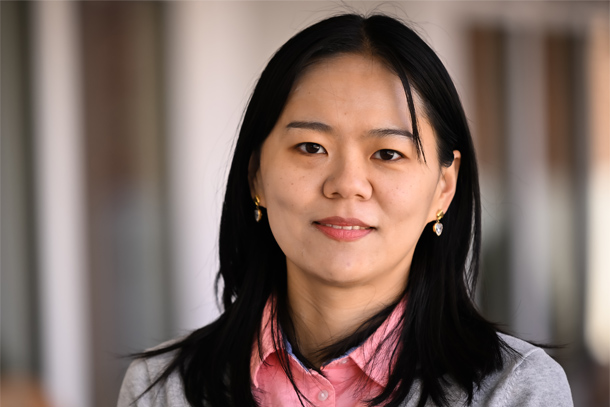
Yunting Liu, assistant professor of electrical engineering in the Penn State College of Engineering. Credit: Poornima Tomy/Penn State
Yunting Liu receives 2024 NSF CAREER Award
March 11, 2024
UNIVERSITY PARK, Pa. — Yunting Liu, assistant professor of electrical engineering in the Penn State College of Engineering, earned a five-year, $550,000 U.S. National Science Foundation (NSF) Early Career Development (CAREER) Award for a project titled “Irregular Modulation: Harnessing the Hidden Potential of Pulse Width Modulation.”
Q: What do you want to understand or solve through this project?
Liu: I aim to revolutionize the field of power electronics by introducing irregular modulation theory to conventional pulse width modulation, which enhances the control bandwidth and induces faster response times in power converters. Traditional power converter modulation techniques have stagnated due to limitations imposed by sequential computing devices, such as digital signal processors. However, with recent advancements in parallel computing and artificial intelligence, there is an opportunity to unlock the hidden potential of converter modulation.
Additionally, I aim to address imposter syndrome among students, particularly those from underrepresented groups, through the Mini-Task Inspired Learning Experience (M-TILE) approach.
Q: How will advances in this area impact society?
Liu: Advances in power converter modulation have the potential to significantly impact society in several ways. First, the irregular modulation to be developed in this project serves power converters, which are key elements interfacing renewable energy with power grids. This can contribute to the development of more sustainable energy systems, reducing energy waste and environmental impacts. Secondly, the integration of power converter modulation with artificial intelligence technologies can lead to the emergence of new grid services, improving the stability and resilience of power grids.
Moreover, by addressing imposter syndrome through educational interventions, we can cultivate a more inclusive and diverse science, technology, engineering and mathematics (STEM) workforce, ensuring that talent from all backgrounds can contribute to technological advancements and innovation.
Q: Will undergraduate or graduate students contribute to this research? How?
Liu: Undergraduate students will have the opportunity to participate in hands-on research experiences through the M-TILE programs. By engaging in practical tasks and projects related to irregular modulation, students will gain valuable insights into power electronics and develop critical thinking and problem-solving skills. Graduate students will be involved in conducting advanced research, exploring new modulation techniques, and developing novel control strategies. They will become the first student group to get involved with the M-TILE concepts throughout their curriculum learning and research studies. My intent for this project is to involve students at all levels and expose them to cutting-edge knowledge in the field of power electronics with confidence.
Q: The NSF CAREER award not only funds a research project, but it also recognizes the potential of the recipient as a researcher, educator and leader in their field. How do you hope to fulfill that potential?
Liu: I am deeply honored to receive the NSF CAREER award, and I am committed to fulfilling its potential as a researcher, educator and leader in the field of power electronics. As a researcher, I will strive to push the boundaries of knowledge in power electronics through innovative research on irregular modulation. This CAREER project provides me a great opportunity to explore a research area where few studies exist. I expect that this project will lead to a variety of high-impact papers, collaborations with industry partners and future funding, which will help me establish myself as a leading expert in this area.
As an educator, I will integrate my research findings into the classroom, providing students with cutting-edge knowledge and hands-on learning experiences. Through outreach activities, I will inspire the next generation of engineers and scientists and promote diversity and inclusion in STEM fields.



